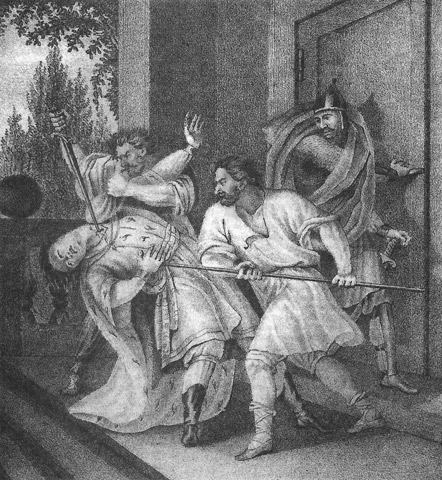Think Out Loud
"We do not learn from experience, we learn from reflecting on experience." -John Dewey
Why We Love the Murderer

Justin St. Germain’s moody essay, “Murder Tourism in Middle America,” follows the thoughts of a brooding, pessimistic young professor on a quest to satisfy his obsession with Truman Capote’s nonfiction novel In Cold Blood, while he rebels against everything it stands for.
St. Germain, who describes his surroundings (and everything else) in fatalistic terms — the “apocalyptic flatness” of the landscape, a skyline like “the screen of a heart monitor” — has suffered tragic, soul-deadening loss with the murder of his mother at the hands of a stepfather. Now he’s in the final editing stages of his own nonfiction novel depicting the family tragedy, a tragedy about a victim; he wants to wrest the cultural narrative away from Capote’s fawning depiction of murderers.
St. Germain blames Capote’s seminal work for kickstarting a cultural obsession with killers, giving license to tourists of psychological terror who lionize the violent perpetrators and denigrate the complex humanity of their victims.
Moreover, our grief-stricken narrator suspects that murderers became the protagonists in popular tales of violence because, really, people fantasize about having the power to end someone’s life.
But is that it?
St. Germain has a dark view of humanity, which makes sense for the son of a murder victim. Still, his view of human motivation as power struggle and dominance is wildly out of step with my own.
I think we’re more stupid than evil. We’re more lazy than proactively violent and prone to struggle.
Power struggles exist, sure, and especially in times and settings of scarcity. When survival is at stake, you must wield whatever power you can muster. Thankfully though, plenty of people don’t live in scarcity, and I would argue that exerting power over others is rarely if ever a motivation for the non-psychopathic.
I tend to think we’re much simpler than all that. I think we’re driven by a more or less bumbling curiosity, a crude fascination with novelty.
That certainly seems to be the opinion of news media giants, who constructed their profit-guzzling monoliths by transforming news into infotainment.
###
My friend Katie introduced me to a podcast called “My Favorite Murder,” some time ago. Each episode features two chatty comedians gushing over the details of one or two heinous killings. The show has its own slogan, abbreviated SSDGM (Stay Sexy, Don’t Get Murdered), which fans, called Murderinos, emblazon on T-shirts and tattoo on their bodies in solidarity.
Katie says she listens as a form of self-defense. The more she knows about the minds and habits of murderers, the more she can protect herself from them.
I’ve turned this over in my mind as a possible motivation for my own mild obsession with true tales of violence. It doesn’t sit well with me. I’d like it to be true, but it rings a bit false. It’s a partial truth, really.
Honestly, what grabs me is the weirdness. Killing is a moral and psychological aberration. It’s a denial of our capacity for human empathy, and what could be more human than our ability to wonder about and even feel in some small measure the unknowable experiences of those around us?
It used to be acceptable practice to go to a carnival and gawk at a freak show. The Elephant Man. Hypertrichosis, the genetic condition that causes hair to grow across nearly every surface of the body, was a source of tremendous amusement in sixteenth century royal courts, and likely the inspiration for the Beauty and the Beast story.

“Hairy Man from Munich,” a 16th century painting
Now it’s considered impolite to gawk at people for their physical abnormalities, so we’ve moved on to gawk at people for their psychological abnormalities.
What “Murder Tourism in Middle America” gets absolutely right is the moral failing inherent in this vice of entertainment culture. Just like the “apocalyptic flatness” of his landscape, the rendering of a human being into a caricature of victim (or killer) has flattened the whole of their humaneness into a pale imitation of the truth.
St. Germain acknowledges this himself when he expresses doubt about his aim to elevate victimhood with his novel. He has hijacked his mother’s story in a way, denied her the opportunity to tell it (or not) on her own terms, and he has thrust her memory in front of an audience who will only know her through her son’s thoughts surrounding her demise.
Perhaps this is the real, much simpler and banal tragedy of our infatuation with killers and all other celebrities. In our hunt for the titillating and weird, we cruelly and crudely reduce each other’s humanity to a pitiful husk. Moreover, we can hardly avoid this tragic reduction, as it has never been possible to fully understand and therefore honor the whole of another person’s life.
But I think we also fight against this limitation. We do it when we lose ourselves in wonder about the minute details of another person. We do it when we spend days on end living the simple realities of a shared life.
We do it when we love.
